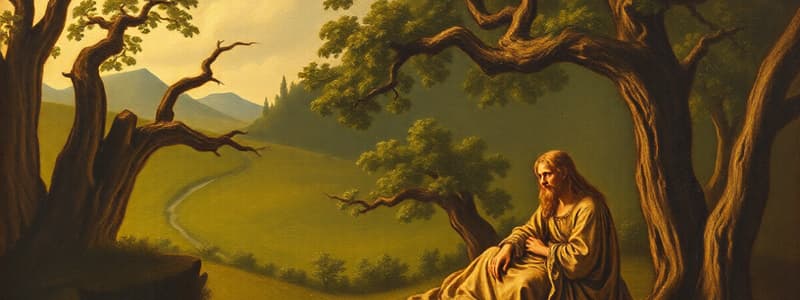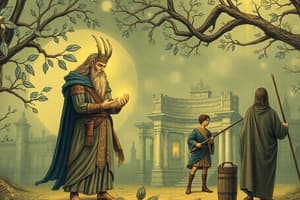Podcast
Questions and Answers
What was a significant consequence of the Roman withdrawal from Britain in 410 AD?
What was a significant consequence of the Roman withdrawal from Britain in 410 AD?
- The Britons united against the Angles.
- Britons faced invasions from Picts and Scots. (correct)
- Christianity was immediately adopted.
- A period of peace was established.
Which of the following best describes the primary characteristics of Anglo-Saxon warriors?
Which of the following best describes the primary characteristics of Anglo-Saxon warriors?
- They were known for their use of chariots.
- They fought primarily with large shields.
- They often wore breastplates and helmets with decoration. (correct)
- They relied on long-range slingshots in battles.
What role did Augustine play in the context of Old English Literature?
What role did Augustine play in the context of Old English Literature?
- He wrote significant poetry in Old English.
- He translated Old English texts into Latin.
- He established a center of learning for Christianity. (correct)
- He was the first historian of the English nation.
Which of the following statements about 'Beowulf' is true?
Which of the following statements about 'Beowulf' is true?
What is notable about Caedmon's contributions to Old English literature?
What is notable about Caedmon's contributions to Old English literature?
What is the primary theme of the morality play 'Everyman'?
What is the primary theme of the morality play 'Everyman'?
What historical development is closely associated with the Renaissance period?
What historical development is closely associated with the Renaissance period?
Which of the following best describes miracle plays?
Which of the following best describes miracle plays?
Which monarch's reign marked the alignment of the Renaissance in England?
Which monarch's reign marked the alignment of the Renaissance in England?
How did English and Scottish ballads serve communities?
How did English and Scottish ballads serve communities?
Flashcards are hidden until you start studying
Study Notes
Old English Period
- English Literature began in the 7th or 8th century AD.
- The Anglo-Saxons, Angles, Saxons, and Jutes, invaded Britain in 428 AD.
- The Anglo-Saxons were tall, fair-haired people who wore breastplate called "bymies" and fought with swords, spears, bows, and arrows.
- The Venerable Bede (673-735), a monk, wrote the "Ecclesiastical History of the English Nation."
- Alfred the Great (848-899) encouraged scholarly translation from Latin into Old English and is credited with starting the 'Anglo-Saxon Chronicle'.
- 'Beowulf' is considered the earliest English poetry, blending Christianity and paganism.
- 'Beowulf' describes the heroic past of the Anglo-Saxon people and their customs and manners.
- Old English poems, including 'The Battle of Brunanburg', 'The Battle of Maldon', 'The Wanderer', and 'The Sea-Farer' explore heroic and lyrical themes.
- Caedmon (7th century), an unlearned cowherd, is the first known English poet, credited with acquiring the gift of poetic song.
- Sir Thomas Malory’s 'Le Morte d’Arthur' is a collection of stories surrounding King Arthur and his Knights of the Round Table.
Middle English Period
- Middle English Drama began with the dramatization of biblical passages of the resurrection and nativity of Christ.
- Miracle and mystery plays developed as celebrations of religious feasts and fasts.
- Miracle plays were based closely on the narratives of the Bible.
- Morality plays, such as 'Everyman', focused on morality lessons, personifying abstract concepts such as Death, Health, and Sins.
- English and Scottish ballads, like 'Sir Patrick Spens', were sung at social gatherings, preserving local events, beliefs, and characters.
The Renaissance Period
- The Renaissance swept Western Europe in the 15th century, signifying a "rebirth" of ancient Greek learning.
- Gutenberg's invention of printing with movable types fueled a spirit of inquiry and hastened the decline of feudal institutions.
- In England, the Renaissance coincided with the reign of the Tudors, including Henry VIII, Edward VI, and Elizabeth I.
- England became a world power during Elizabeth I’s reign.
- The year 1485 is a significant turning point for England, marking the shift from medievalism to the Renaissance.
The 18th Century
- Oliver Goldsmith (1728-74) wrote significant plays ("She Stoops to Conquer"), poems ('The Deserted Village'), and novels ('The Vicar of Wakefield').
The Romantic Movement in England
- Romanticism emphasized the importance of the individual, imagination, and intuition.
- Romanticists believed in equal opportunity and treatment for all humans, advocating for life, liberty, and equal opportunity.
- Romanticism promoted a shift from reason to the senses, feelings, and imagination.
- It celebrated the rural and natural over the urban and sophisticated, subjective poetry over public and impersonal poetry.
- Romanticism embraced the mysterious and infinite over the scientific and mundane.
- Writers found inspiration in old legends, folk ballads, antiquities, ruins, and rustic characters.
- Romanticism encouraged writers to draw upon their senses and imagination, making nature scenes come alive in writing.
- Romanticism included elements of the eerie and supernatural such as ghosts, haunted castles, fairies, and mad folk.
Pre-Romantic Writers
- Robert Burns (1759-1796) wrote nature lyrics, sentimental songs, and humorous works.
- Mary Wollstonecraft (1759-97) wrote 'Vindication of the Rights of Women', one of the first feminist books in literature.
- The Gothic school of writers focused on terror and imagination, with notable works including 'The Castle of Otranto', 'The Mysteries of Udulpho', and 'The Monk'.
Colonial Period in New England
- **Anne Bradstreet **(1612-1672), a well-educated, well-traveled Puritan who wrote verse and prose about her inner life, her family, and her faith.
- **Edward Taylor **(1642-1729) kept a journal to keep track of his religious life.
The American Enlightenment
-
**Benjamin Franklin **(1706-1790) played pivotal roles as a writer, printer, publisher, scientist, philanthropist, and diplomat. He famously wrote the "Autobiography," a self-improvement manual that covered topics such as temperance, resolution, and moderation.
-
**Thomas Paine **(1737-1809) authored influential political pamphlets, like "Common Sense," which sold over 100,000 copies in its first three months of publication.
-
**Philip Freneau **(1752-1832) was a poet of the American Revolution who incorporated European Romanticism into his work.
-
**Washington Irving **(1789-1859) became a cultural and diplomatic ambassador to Europe, much like Benjamin Franklin.
-
William Carlos Williams (1883-1963) championed the use of colloquial speech in American poetry, incorporating natural rhythms from American English.
-
Edward Estlin Cummings (1894-1962), known as e.e. Cummings, wrote innovative verse with humor, grace, and experimentation with punctuation and visual format.
-
Langston Hughes (1902-1967) was an influential poet of the Harlem Renaissance, known for his celebration of African-American culture and identity.
Prose Writing, 1914-1945: American Realism
- **F. Scott Fitzgerald **(1896-1940) is known for 'The Great Gatsby', a novel about the American dream and the self-made man.
- **Ernest Hemingway **(1899-1961) is a beloved American novelist whose iconic works examined themes of war, loss, and masculinity.
- **John Steinbeck **(1902-1968) blended realism and romanticism, celebrating the virtues of farmers close to the land.
- **Sylvia Plath **(1932-1963) wrote deeply personal and confessional poetry that explored themes of identity, loss, and mental illness.
- **Richard Wright **(1908-1960) wrote about racial prejudice, social inequality, and the experiences of African-Americans in the United States.
20th Century American Drama
- **Eugene O'Neill **(1888-1953) was the first American playwright to win the Nobel Prize for literature.
- **Thornton Wilder **(1897-1975) wrote plays like 'Our Town' and 'The Skin of Our Teeth', as well as the novel 'The Bridge of San Luis Rey'.
- **Arthur Miller **(1915) is a prominent American playwright, novelist, essayist, and biographer.
- **Tennessee Williams **(1911-1983) focused on disturbed emotions and sexuality within families, particularly those in the South.
The Affluent But Alienated 1950s
- Writers of this era focused on themes of alienation, conformity, and consumerism in American society.
Significant Writers
- **J.D. Salinger **(1919-2010) is known for his novel "The Catcher in the Rye," which is a coming-of-age story with themes of alienation and adolescence.
- **Jack Kerouac **(1922-1969) was a leading figure in the Beat Generation, known for his novel "On the Road."
- **Allen Ginsberg **(1926-1997) was a Beat poet who influenced American literature and counterculture movements.
Studying That Suits You
Use AI to generate personalized quizzes and flashcards to suit your learning preferences.




